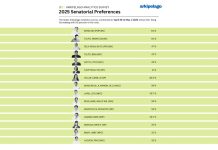
NAME recall may be enough if we elect someone to regulate pedicab fares or rename a porch in a barangay sitio. But when we are electing a senator, someone with national oversight, impeachment powers, and control over billions in public funds, we cannot afford to treat it like a popularity contest. Yet here we are, on the eve of the 2025 midterm elections, bombarded with jingles, ayudas, tarpaulins, click-bait ads, and TikTok dances. Once a chamber of towering intellects and statesmen, the Senate is now a battleground of actors, influencers, and recycled political surnames. Somewhere between the singing jingles and kissing babies, we forgot to ask the most crucial question: What must a senator really be?
A senator must first be a legislator — not a mascot, a mascot handler, or a product endorser. Legislators write laws. They craft national policy. They debate our nation’s direction. This means they need to read, understand, and anticipate implications. Being a TikTok sensation may win votes, but it will not fix inflation, overhaul education, or secure our waters from foreign encroachment. Writing a bill is not like writing a script. Debating the national budget is not like hosting a variety show. It requires both spine and sense. To those who say, “Eh, di naman kailangan magaling basta mabait,” I say, even a kind surgeon must know how to operate. Would you trust someone who cannot read construction blueprints to build your home? Then why vote for someone who cannot grasp the Constitution to reshape the country?
Second, senators must bring integrity to the table. Not the kind they rehearse in press conferences, but the type that resists pork barrel, discretionary, or confidential fund temptations and hidden backroom deals. Integrity is when you vote against your own interest to uphold the nation’s. It is when you disclose your assets without mumbling excuses. It is standing against popular opinion if that means standing for justice. The Senate tries and judges the powers that be. It ratifies international treaties. It can revoke martial law. These are not light duties. They require clarity, courage, and a conscience. That is why electing someone who cannot distinguish a budget amendment from a talent fee is more than just embarrassing; it is dangerous.
Let us be clear: this also applies to members of Congress, provincial board members, city or town councilors, and even barangay kagawads. If you aim merely to distribute jackets, sponsor basketball tournaments, or post filtered selfies during calamities, applying for a barangay tanod’s assistant is more aligned with your gifts. Public office is not a family business to inherit. It is not a retirement plan for beauty queens, comedians, actors, or boxers turned “experts” in defense, diplomacy, or disaster management. We owe it to the next generation to choose better than those who simply make us laugh, cry, or sing along.
A legislator must also know how to listen — not just to the loud, but to the least. Senate hearings should not be performance art, where some just shout for airtime or ask leading questions like trial lawyers in a teleserye. True listening is about engaging experts, civil society, and marginalized sectors. We need leaders who understand nuance and context. Debating reproductive health, internet freedom, or agrarian reform is not just about morality or ideology. It is about science, data, and real lives. Senators are not there to grandstand; they are there to stand for something.
More importantly, legislators must be accountable. No more disappearing acts after the campaign. No more press cons only when in trouble. Senators must file bills, attend hearings, consult their constituents, and disclose votes. The transparency portal should not be an empty shell. Their job is not merely to oppose or approve. It is to propose, refine, and defend public interest. According to the Senate’s own data, some senators have not authored a single meaningful law despite being in office for years. Yet they rank high in surveys, thanks to a killer “pa-cute” smile, a viral video, a twerking performance, a grab of another’s achievement, a “patalang” claim, or a last name passed on like a lucky charm. We need to snap out of this electoral hypnosis.
Yes, we are also talking about local legislators. City councilors and board members are not decorators of resolutions or rubber stamps of the executive. They are expected to scrutinize ordinances, budgets, and executive actions. Some of them do not even read what they sign. Others treat sessions as social hours. It is a shame. In a country where every peso counts, local legislators are our first line of defense against overpriced gym equipment, ghost projects, substandard markets, and useless monuments. Their oversight powers can mean the difference between a functioning barangay health center and another abandoned structure with a politician’s face painted on the wall.
Of course, not every senator must be a lawyer. But every senator must understand the law. They must be learners. They must do their homework. The late Ilongga senator Miriam Defensor Santiago once said, “Ignorance of the law excuses no one. Especially the one who makes it.” When your future senator speaks, listen not to their volume but to their value. Are they discussing the national debt or just counting the lizards on the ceiling with blissful ignorance? Are they offering economic policies or just hollow emotional platitudes? Do they understand the legislative procedure or only know how to say “I move” and have nothing to add thereafter? Do they attend sessions prepared for the deliberation, or do they believe committee hearings are simply for rehearsals?
Voters deserve more than recycled jingles and scripted sincerity. They deserve servant-leaders who have both heart and mind. Leaders who treat power not as a trophy but as a tool. From 2022 onwards, Risa Hontiveros was the lone opposition senator who stood her ground in a chamber full of silence. That takes more than credentials. That takes conviction. Do not ask what school a candidate came from. Ask what ideas they bring. Ask who benefits from their bills. Ask who funds their campaigns. Ask who they remain loyal to after the elections.
To the candidates who are clearly unqualified: No, we are not being mean when we ask about your track record. That is called due diligence. This is not an audition. This is the Senate of the Republic of the Philippines, not the semis of Pilipinas Got Talent. The fact that you are a trending personality does not make you a capable policymaker. Some want to be senators because they were once judges or hosts in talent or game shows. Others think being good at drama or action scenes makes them ready for legislative work. Others even expect to win because the “script” has already been written: They are the “chosen ones. I suggest they stick to reruns. This is not a rerun. This is real life.
The 2025 midterms are not just about voting for who we like. They are about choosing who we trust with our taxes, our rights, and our future. If we choose poorly, we cannot completely blame the candidates. They did not elect themselves. We did. Every wrong vote is not just a mistake. It is a waste of millions of public funds and space. It is a missed opportunity to move this country forward. So before you shade that oval, ask yourself: Will this person write laws under which my children will live? Will they guard the Constitution or gut it? Will they serve or be served?
There are no perfect candidates. But there are principled ones. Seek them out. Support them. Fight for them. In a democracy, the ballot is both a shield and a sword. Use it wisely. Because once the circus ends and the clowns are sworn in, it is too late to wish we had picked statesmen instead of showmen.
***
Doc H fondly describes himself as a “student of and for life” who, like many others, aspires to a life-giving and why-driven world grounded in social justice and the pursuit of happiness. His views do not necessarily reflect those of the institutions he is employed or connected with./PN







